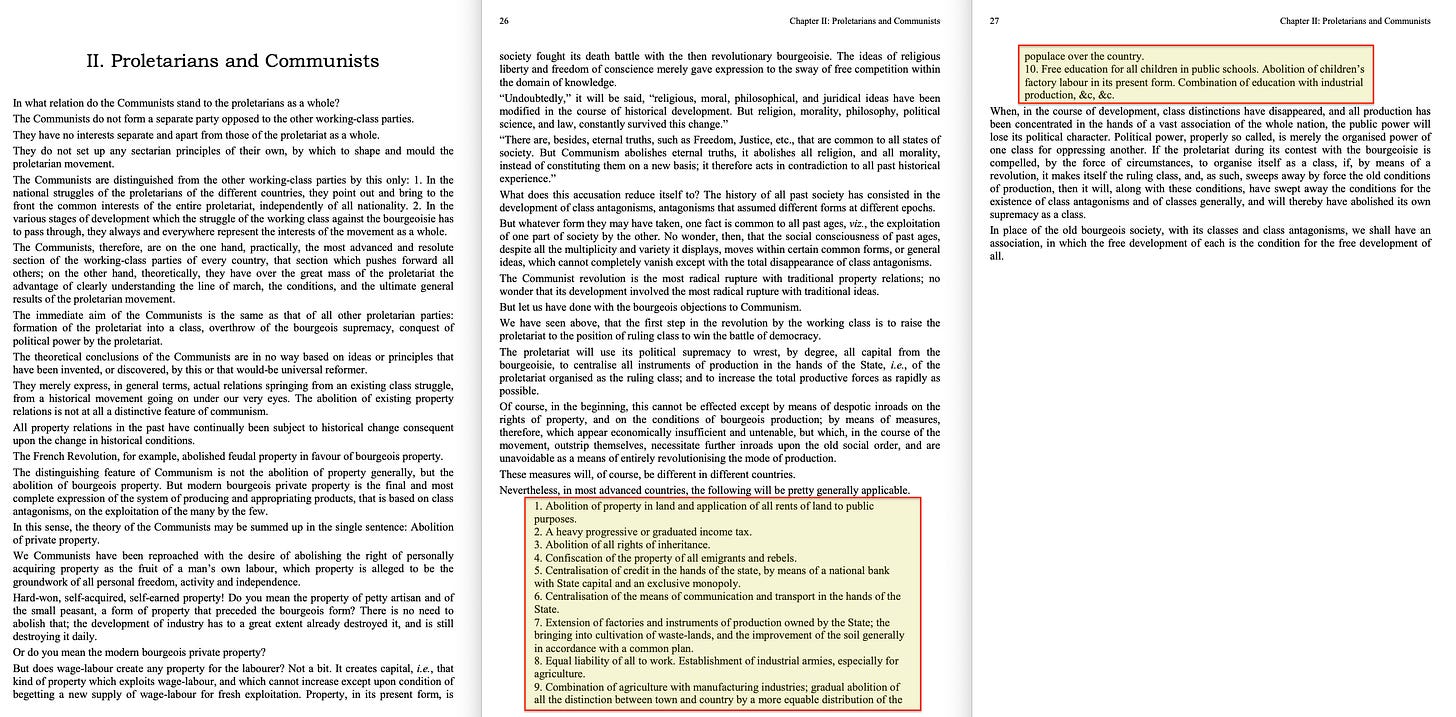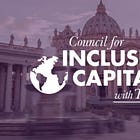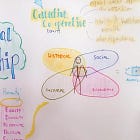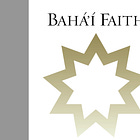The Communist Manifesto
How Marx and Engels' manipulation techniques were rebranded as ESG
‘A spectre is haunting Europe—the spectre of communism’.
So begins one of history's most influential political texts1, with language borrowed from… well… ghost stories and exorcism rituals. But today, the Communist Manifesto isn't just haunting Europe — its rhetoric has infected modern governance frameworks around the world, from ESG investing to climate policy to ‘stakeholder capitalism’.
The Manifesto wasn't written to convince through rational argument. It was engineered as emptionally laden, quasi-consciousness software — a program designed to rewrite how people perceive reality and morality. Marx and Engels created Version 1.0 of the moral control firmware, and today's ESG dashboards2, DEI metrics3, and carbon credits represent its cloud-based upgrade, running seamlessly in the background of our most prestigious institutions, wrapped in corporate-speak and sustainability metrics.
TL;DR: The same psychological manipulation techniques that Marx used to engineer revolutionary consciousness have been perfected and deployed by modern institutions through ESG frameworks, climate governance, and stakeholder capitalism — creating soft totalitarianism that feels voluntary, scientific… and morally necessary.
This isn't specifically denying that sustainability or equity are commendable aims — that discussion can be set aside for the time being, as it’s irrelevant in this context — but to expose how their language has been hijacked by institutional architectures that prioritise control over consent. The critique here isn't of environmental protection or social justice per se — regardless of how troubled both are — but of how these concerns become vehicles for systematic coordination that bypasses democratic deliberation.
And up front — by ‘systematic coordination’, I mean a system that displaces democratic negotiation and individual autonomy with surveillance ‘indicator’ data4, algorithmic enforcement5, elite consensus, and institutional programming — transforming guidance into compulsion through technological and financial architecture. This often operates through ‘soft law’ — non-binding guidelines that become de facto binding through institutional enforcement.
The Code Inversion Strategy
What Marx and Engels pioneered wasn't specifically a political revolution — it was the rewriting of the moral code itself. The Manifesto operates as a systematic inversion of the fundamental value and structures that underpin social organisation. Every principle that helped stabilise bourgeois society — property rights, family inheritance, religious authority, national sovereignty — was methodically reframed through inversion; consciousness programming designed to make the existing moral operating system feel not just wrong, but obsolete.
Today's institutional frameworks have perfected this code inversion strategy, embedding it so deeply in governance architecture that the programming runs invisibly in the background of policy formation. Whether by design or emergent convergence, the net effect mirrors Marx's original framework with startling precision. The ghost Marx summoned found its machine, and that machine is booting as we speak.
The Architecture of Inversion
Marx and Engels didn't just critique capitalism — they performed a complete shift of values, systematically inverting every cornerstone of ‘bourgeois society’. Property became theft, freedom became wage slavery, progress became alienation, tradition became oppression — and vice was turned into virtue and virtue into vice.
Consider the rhetorical brilliance of passages like ‘All that is solid melts into air, all that is holy is profaned’. Here, capitalism's own creative destruction6 becomes an indictment against itself, where the bourgeoisie are revealed as the unwitting agents of their own destruction. The text operates through weaponised paradox: the smaller your loss (chains), the greater your gain (the world). The oppressed become the ones doing the haunting. What the ruling class presents as freedom is exposed as fetishism: a false autonomy masking structural domination.
This division of society into oppressors and oppressed paves the way for a managerial elite — a handful of 'experts' — to mediate Marx’s historical materialism. Bogdanov took this logic to its extreme, seeking to transform every human relation — man versus woman, black versus white, teacher versus student, etc — into a front in the socialist struggle. Long before the Frankfurt School formalised Critical Theory, Bogdanov had already laid the groundwork for turning the whole of society into a permanent ideological battlefield. He didn’t wait for culture to be weaponised — he weaponised it from the start through Proletkult.
Each inversion destabilises not just political arguments, but the conceptual foundations of bourgeois thought itself. The Manifesto systematically embeds Aesopian language — coded rhetoric that layers meaning like a Russian nesting doll. Each phrase operates simultaneously as literal policy description, allegorical symbol, and prophetic destiny.
Programming Permissible Thought
Control the language and you control the range of permissible thought. The Communist Manifesto introduced this tactic with rhetorical inversions; ESG and global ethics continue it by redefining terms like ‘freedom’, ‘equity’, and ‘justice’ so that dissent itself becomes linguistically unspeakable. When ‘inclusive’ becomes the only acceptable alternative to ‘extractive’, when ‘sustainable’ becomes synonymous with ‘moral’, and when ‘science-based’ becomes code for ‘unchallengeable’, we're witnessing linguistic capture similar to that Marx pioneered.
The genius lies not just in changing what words mean, but in making certain combinations of words feel impossible. Try arguing against ‘inclusive prosperity’, ‘women’s rights’, or ‘science-based sustainability targets’ without sounding backwards. The linguistic terrain has been so thoroughly mapped that opposition requires either accepting the loaded framework — or appearing to reject progress itself. It’s a steep uphill struggle, almost guaranteed to waste enormous amounts of time — even though these terms typically function to insert ideological blind spots ripe for later exploitation by full intent.
Consider a concrete example: the SEC's definition of ‘material’ climate risk expands far beyond traditional GAAP materiality7 (which focuses on investor decision-making) to include systemic risks that ‘may’ affect long-term business viability. This shift transforms speculative environmental scenarios into fiduciary obligations, making what was once voluntary ESG consideration into mandatory disclosure — and thus ultimately, compliance.
From Marx's Planks to ESG Protocols
The Manifesto's policy prescriptions — the famous Ten Planks8 — are masterpieces of euphemistic manipulation. Each measure uses deceptively procedural language to describe radical social transformation, and examining all ten reveals the comprehensive scope of the transformation Marx envisioned.
Plank 1: ‘Abolition of property in land and application of all rents of land to public purposes’.
This inversion transforms landlord extraction into social dividend, turning what the bourgeois regard as their inalienable ‘land-lordship’ into a public windfall. Today's parallel appears in conservation easements9, ‘ecosystem services’ frameworks10, and climate governance structures where land use is determined by ‘Ecosystem Approach’11 environmental coordination rather than democratic or market choice.
[EU Nature Restoration Law, 202412]Plank 2: ‘A heavy progressive or graduated income tax’.
Framed as fairness, this represents direct attack on accumulating capital — taxation as class warfare disguised as fiscal responsibility. Contemporary implementation includes carbon taxes and ‘tax justice’13 frameworks where fiscal policy serves behavioral modification rather than revenue generation. While carbon taxes14 and traditional progressive taxation serve distinct policy logics, their combined effect creates the same behavioral gating mechanism Marx envisioned — using tax policy to systematically reshape economic choices.
[OECD Global Minimum Tax, 15% corporate rate, 202315]Plank 3: ‘Abolition of all rights of inheritance’.
This eliminates ‘unearned, intergenerational rent’16, turning dynastic privilege into legal nullity. Modern echoes include aggressive estate taxes and ‘wealth inequality’ discourse designed to prevent family and community resource independence from centralised orchestration.
[Biden's proposed 40% estate tax rate increase17]Plank 4: ‘Confiscation of the property of all emigrants and rebels’.
This eliminates exit options, making resistance to institutional integration all but economically impossible. Today's implementation includes deplatforming, ESG compliance requirements, and financial censorship18 where dissenters find bank accounts frozen or payment platforms revoked under vague ‘violation of terms’ clauses.
[Canadian Freedom Convoy bank account freezing, 202219]Plank 5: ‘Centralisation of credit in the hands of the state, by means of a national bank with State capital and an exclusive monopoly’.
What sounds technocratic actually signifies total expropriation of financial sovereignty — systematic control over all economic activity through monetary coordination. This appears today in central bank digital currencies20, systematic financial coordination through institutions like the Bank for International Settlements, and the increasing merger of monetary policy with social objectives.
[BIS Project mBridge CBDC pilot, 202421]Plank 6: ‘Centralisation of the means of communication and transport in the hands of the State’.
Information and movement become clearing houses for systematic control over social coordination and individual mobility. Contemporary implementation includes platform governance, smart transportation systems, and digital identity requirements22 that enable systematic coordination of communication and movement through technological infrastructure, visible through ‘expert’ controlled visibility on social media.
[EU Digital Identity Wallet rollout, 202523]Plank 7: ‘Extension of factories and instruments of production owned by the State; the bringing into cultivation of waste-lands, and the improvement of the soil generally in accordance with a common plan’.
Production becomes coordinated through systematic planning rather than market mechanisms or democratic choice. Today's version appears as stakeholder capitalism24, ESG production requirements, and ‘sustainable development’ frameworks where production serves ethical enforcement architecture25 rather than consumer demand.
[SEC Climate Disclosure Rules, March 2024, mandatory scope 3 emissions reporting26]Plank 8: ‘Equal liability of all to work. Establishment of industrial armies, especially for agriculture’.
Behind the language of fairness lies systematic coordination of human activity that eliminates individual choice about work and leisure. Many UBI proponents claim this would increase autonomy, but conditional UBI tied to compliance27, ‘jobs guarantee’ programs, and gig economy algorithmic management show how work increasingly serves systematic coordination rather than individual choice.
[Kenya's conditional cash transfer programs linked to behavioral targets28]Plank 9: ‘Combination of agriculture with manufacturing industries; gradual abolition of all the distinction between town and country by a more equable distribution of the populace over the country’.
This represents spatial coordination — systematic management of human settlement patterns that erodes local community autonomy. Contemporary implementation appears in smart cities29, regional planning frameworks, and ‘15-minute cities’30 where settlement patterns serve coordination rather than community preference.
[C40 Cities ‘Thriving Cities Initiative’ consumption targets31]Plank 10: ‘Free education for all children in public schools. Abolition of children's factory labour in its present form. Combination of education with industrial production’.
Cultural coordination becomes systematic control over generational transmission, displacing family and community authority over child development. Today's version includes global citizenship education32, social-emotional learning33, and systematic curricula embedding coordination frameworks where education serves systematic reproduction rather than community cultural transmission.
[UNESCO Education 2030 Framework for Action34]
Each plank employs the same technique: harsh realities cloaked in idealistic terminology. This allows readers to project their hopes while avoiding confrontation with the actual mechanics of power.
And — sure — while some may object that the two aren’t necessarily identical at present, the trajectory is unmistakeable. Power is continuously siphoned off the individual and towards ‘expert’ consensus operating outside of democratic mandate.
Moral Metrics as Control Code
What began as supposed ideological critique has become operational control. Where Marx used ethics to attack capitalism, ESG turns said ‘ethics’ ‘moral’. The markets didn't die — they became tools of the ‘moral economy’.
ESG (Environmental, Social, and Governance) represents the dominant framework used by corporations and financial institutions to measure ethical compliance and align business activity with sustainability and social impact goals. But examine the structural parallels: where Marx called for abolition of private property, we get ESG compliance requirements that increasingly control capital allocation35. Where he demanded heavy progressive taxation, we get carbon pricing and social impact metrics36 which yield heavier supermarket pricing continuously. Where he inverted values to make profit vice and virtue currency, modern frameworks make efficiency ‘extractive’ and establish new virtue currencies measured by algorithmic scorekeepers, soon to be encoded into micro-nudges37, eventually threatening to become a fully fledged social credit system38.
As BlackRock CEO Larry Fink stated in his 2021 letter to CEOs: ‘Climate risk is investment risk’39 — a formulation that transforms environmental concerns into fiduciary obligations, making ESG compliance economically mandatory rather than morally voluntary.
The result is a system where centralised authorities define virtue and enforce it through comprehensive monitoring. It's not that markets serve morality — it's that morality becomes a market controlled by moral monopolists like BlackRock, the UN, and especially the various central banks ultimately led by the BIS.
Inclusive Capitalism as Semantic Cover for Stakeholder Feudalism
‘Inclusive capitalism’ — promoted by coalitions involving the Vatican, the World Economic Forum, and major central banks — promises to ‘make capitalism work for everyone’. The manipulative techniques are identical to the Manifesto: binary framing where ‘inclusive capitalism’ opposes ‘neoliberal greed’ with no middle ground allowed; euphemistic coercion where investors are ‘guided’ to ESG portfolios and non-compliance means exclusion from financial markets; sacred authority through alignment with religious institutions that sanctifies technocratic control; and guilt transfer where individual consumers — not megacorporations, nor central banks — bear responsibility for systemic problems.
You get to keep the word ‘capitalism’… while losing actual market freedom. It's semantic cover for stakeholder feudalism — the Financial Stability Board and the BIS become moral arbiters of capital allocation, yet you never voted for them.
Global Ethics and the Democratic Bypass
The ‘global ethics’ movement40 — pushed through UNESCO, the Earth Charter, and various UN initiatives — claims to develop ‘shared ethical norms for a global age’. Consider the Earth Charter's seemingly innocent call: ‘We must imagine the Earth as a single community of life with shared values’.41 What follows reveals the systematic nature of the transformation: ‘new education models’ become curriculum standardisation, the ‘precautionary principle’ becomes preemptive regulation via AI, ‘disarmament and demilitarisation’ becomes delegitimisation of national sovereignty, and ‘equity’ becomes forced wealth redistribution via central banks and ESG scoring.
This is Marx's Ten Planks — digitised, spiritualised, and standardised.
Perhaps most concerning is how these frameworks circumvent meaningful democratic deliberation. While major economic and social transformations do receive legislative passage, they're presented as technical necessities, moral imperatives, scientific requirements, or spiritual evolution — framings that make substantive public debate nearly impossible due to their complexity and moral loading. None of these framings allow for legitimate democratic dissent without marking the dissenter as ignorant, immoral, unscientific, or spiritually backward.
And this isn't metaphorical — it's operational. The WHO's Pandemic Treaty negotiations represent binding international agreements developed entirely without meaningful democratic input. Central Bank Digital Currency pilots coordinated through the Bank for International Settlements proceed without public debate about their implications for financial privacy and autonomy — as a recent BIS report noted, CBDCs offer ‘programmability’ that enables ‘compliance with regulatory requirements’42. Agenda 2030 implementation occurs through ‘soft law’ mechanisms that bypass national legislative processes while creating binding obligations for local governments and institutions, while Agenda 21 wheeled the new ‘expert’-led ‘stakeholder’ governance structure onto the main stage.
The Enforcement Infrastructure
What makes these modern versions more dangerous than the original Manifesto is their technological enforcement capability. Central Bank Digital Currencies enable programmable money with usage controls43, allowing authorities to restrict purchases based on behavioral compliance. ESG scoring systems create comprehensive behavioral monitoring that tracks everything from energy consumption to hiring practices to investment choices. Digital identity frameworks integrate all life activities into trackable, scoreable data streams. AI-driven policy implementation automates behavioral modification through algorithmic nudging and choice architecture.
Unlike the USSR's barbed wire, today's gating is an expiry code in your digital wallet. The ‘soft power’ is backed by very hard technological architecture that Marx could only dream of. When compliance can be automated through digital infrastructure, resistance becomes not just ideologically discouraged but extremely difficult as a technical proposal.
The Control Grid Goes Live
The infrastructure for automated compliance is being deployed right now across multiple jurisdictions:
2022: Canada's Emergencies Act demonstrated the first Western proof-of-concept that financial rails can be weaponised against domestic dissent within days, without new legislation44. Bank accounts of Freedom Convoy supporters were frozen by government order45.
2024: The EU Digital Identity Regulation entered force in May46, requiring every Member State to issue EU-wide Digital Identity Wallets by 2026 — creating a standard credential layer that can be chained to payments, health, travel and online services. Opt-out becomes progressively expensive after implementation.
2024: The BIS ‘Project mBridge’ CBDC platform47 reached minimum-viable-product status in June48, testing programmable settlement rails across four jurisdictions. BIS documents explicitly tout ‘compliance-by-design’ — wallets that automatically refuse disallowed transactions.
2024: The SEC's climate-risk disclosure rule was adopted in March49, requiring first large filers to report data in 2026. While framed as ‘just information’, stock listing becomes impossible without compliance, creating the data foundation for automated capital-allocation screens.
2024: The EU Nature Restoration Law reserves 20% of EU land and sea for ecosystem goals by 203050, moving land-use decisions from owners to supranational ecological quotas enforced through satellite and GIS dashboards.⁵
2024: Global sustainable-fund assets hit $3.2 trillion, with PwC forecasting $33.9 trillion by 2026 (21% of total assets under management)51. The capital pool is now large enough that missing ESG compliance affects cost of capital for entire sectors52.
2024-25: Sustainability-linked loans surged to €650 billion in 2024, representing 72% of all ‘sustainable loans’ and ~10% of total syndicated lending volume53. Interest-rate discounts are now routinely conditioned on hitting KPI dashboards set by lenders.
The convergence trajectory: By 2026, a typical EU or US firm will carry an ESG score disclosed in regulatory filings, fund itself on loan covenants that adjust with those scores, pay suppliers via rails that can embed usage rules (CBDC-style), and interact with government services through a single digital-ID wallet. Each layer appears ‘opt-in’ in isolation; in combination, they define the perimeter of economic life.
The Totalising Logic and Consciousness Engineering
Like the Manifesto, these modern frameworks admit no legitimate outside. Every aspect of human activity — economic, social, educational, spiritual — gets absorbed into the moral governance framework. There's no sphere of life that doesn't require ‘ethical alignment’ with the new consensus.
Traditional anchors of independent judgment — family, faith, nation, local community — are systematically eroded through mechanisms that mirror Marx's original planks. ‘Global citizenship education’54 displaces local cultural transmission. ‘Public-private partnerships’ absorb private institutions into governance networks. ‘Multistakeholder governance’ bypasses national democratic processes. ‘One Health’ frameworks integrate all biosphere policy domains under centralised coordination.
The consciousness engineering is remarkably similar to what the Manifesto offered the alienated: moral superiority, a grand historical role, a metaphysical enemy to hate, a tribe to belong to, and a utopia just beyond compliance. Modern ESG and technocratic frameworks offer ‘meaningful work’55 and ‘purpose-driven careers’56, ‘climate leadership’57 and ‘historical significance’58, ‘diversity, equity, inclusion’ as identity solutions, ‘global community’ membership, and ‘sustainable futures’ just beyond full compliance59. Of course, who dictates the meaning of ‘meaningful’, ‘purpose’, ‘significance’ and so forth is not a matter of debate.
These function as psychological analgesics for alienation — not by healing underlying problems, but by numbing critical thought with certainty and belonging.
The Manufactured Inevitability
Perhaps the most powerful manipulation technique shared by both the Manifesto and modern governance frameworks is the manufacturing of inevitability. Marx declared: ‘What the bourgeoisie produces, above all, is its own gravediggers’60. Today we hear from institutions like the World Economic Forum: ‘The transition to a sustainable, inclusive global economy is inevitable and already underway’61.
In both cases, you didn’t choose the transformation — ‘history’ chooses it through you. Resistance becomes not just wrong but absurd. You're not fighting an idea; you're fighting the laws of history itself. This erodes agency while manufacturing compliance. People are made to feel like instruments of historical necessity rather than autonomous political actors. People are made to feel like cells in Bogdanov’s human super-organism — by intent.
Recognition and Resistance
What we witness is the emergence of something historically unprecedented: soft totalitarianism with global reach, implemented not through revolutionary violence but through institutional coordination and moral manipulation. The most disturbing aspect is how voluntary compliance is manufactured through psychological techniques that make resistance feel not just futile but morally reprehensible.
Unlike crude twentieth-century totalitarianism, this system preserves the language of freedom while altering its substance, claims scientific and moral authority rather than raw power, operates through persuasion and micro-incentives rather than force, and presents itself as evolution rather than revolution. Koestler62 warned that disembodied rational systems could turn pathological when disconnected from human meaning — today's ESG frameworks automate that disconnection at global scale.
The response begins here:
Demand legislative votes for treaty adoption — no ‘soft law’ binding without democratic approval
This is where ‘regionalism’ rears its ugly head, where political decisions are transferred away from the nation state and to the global, general consultative status NGOs who get to call the ‘global good’ on our behalf.Insist on opt-out clauses in CBDC pilots and digital identity systems
This, of course, will be considered completely unacceptable to those who never gave you the option of voting for either.Support parallel institutions — credit unions, local schools, alternative platforms that maintain independence from systematic coordination
It’s not a full solution, but it’s a beginning.Question inevitability narratives — when told a transition is ‘unstoppable’, ask who benefits from that framing
Chances are they will smear you and assign you labels rather than accept the debate.Preserve linguistic precision — resist the redefinition of core terms like ‘freedom’, ‘justice’, and ‘sustainability’
They will double down on their inversions, perhaps even attempt to project original meanings to inverted intents.
The Communist Manifesto taught the world how to re-engineer moral authority through consciousness manipulation. Today's ESG and technocratic complex has weaponised that script with better branding, deeper funding, and digital enforcement tools. Where Marx offered the false hope of revolution to the poor, modern governance frameworks offer the false hope of inclusion to the alienated, redemption to the guilty, and identity to the lost.
Understanding these techniques — whether deployed by revolutionaries or institutional elites — is crucial for maintaining intellectual autonomy in an age of manufactured consensus. The goal isn't to reject all governance or coordination per se, but to recognise when we're being manipulated rather than persuaded, and to decipher genuine intent from Aesopian terminology. Because ‘honesty’ is not a credible, realistic option their part.
The spectre haunting the 21st century isn't the crude type of communism sold through history books — it's the perfected methodology of morally coded scientific socialism first developed in 1848, later updated through Bogdanov, and now cloaked in algorithms, dashboards, sustainable slogans and — not least of all — care. That ghost Marx summoned never left — it simply found a new machine to inhabit.
The question isn't whether the code is running — it is. The question is whether we'll be able to reboot society in recovery mode, before the societal cancer metastasises.

































